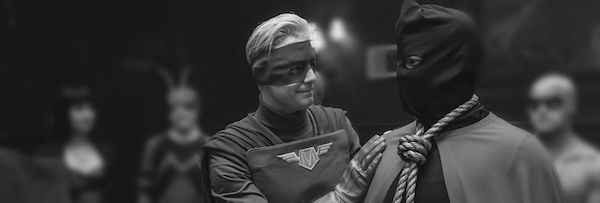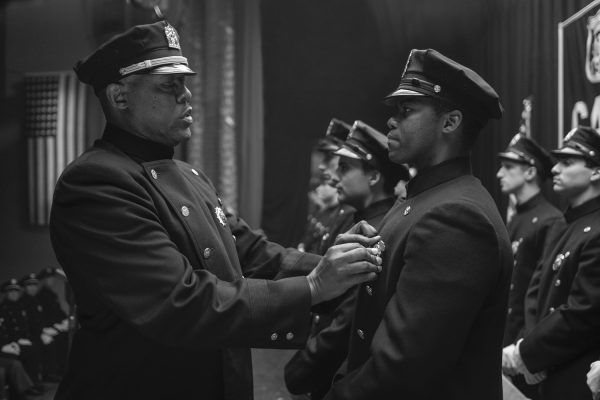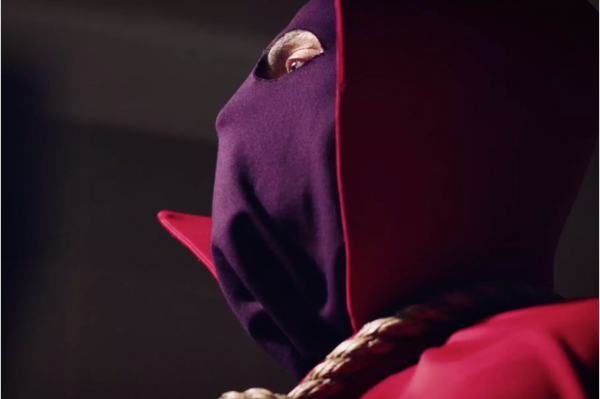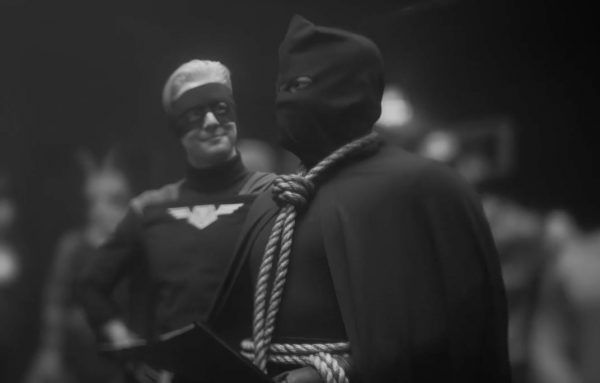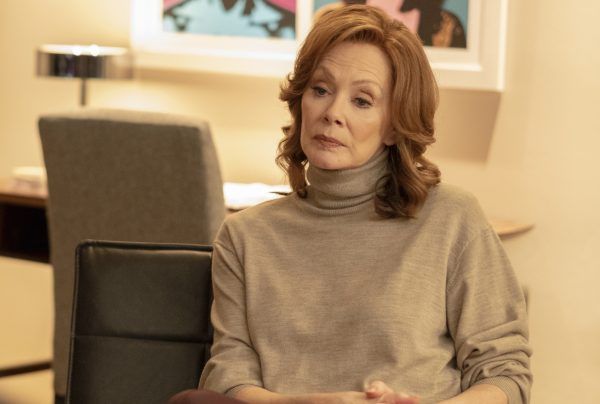The game-changing comic series Watchmen defied all the rules and every expectation to become one of the most celebrated and beloved “superhero” stories of all time. It’s only fitting that to pull off the impossible – a sequel series that lived up to the original material -- HBO’s Watchmen would have to do the same. Created by Damon Lindelof, the 9-episode series lovingly reinvented and updated the world created by Alan Moore and Dave Gibbons, picking up with the iconic “old testament” characters (as the creative team called them) decades later, introducing new characters to share the screen with them, and shading in some of the original materials greatest mysteries.
Perhaps no episode of Watchmen weaves that multitude of threads together with as much style and finesse as “This Extraordinary Being”; the hour dedicated to uncovering the truth behind Hooded Justice. Directed by Stephen Williams and written by Cord Jefferson, the sixth episode sends Regina King’s Angela Abar on a shattered journey into her grandfather’s past, where she witnesses first-hand the atrocities he faced and the vigilante he became to fight them. It’s not just a staggering, self-contained hour of scripting, it’s shot in a series of black-and-white vignettes, each staged as an immersive single-take sequence that drops the audience right into Angela — and Hooded Justice’s _ shoes.
With Watchmen in contention for a mighty 26 Emmys at this year’s ceremony (8 of which are for “This Extraordinary Being,” including Best Director), I had the opportunity to jump on the phone with executive producer and director Stephen Williams to discuss his creative process on the show and reuniting with Lindelof after Lost.
To back it up a little bit, and you can correct me if I'm wrong, but I don't believe you worked on The Leftovers. So how did you come to reunite with Damon on Watchmen?
STEPHEN WILLIAMS: You know, you're right. I was unable to work on Leftovers, I'd just been booked on other things and timing didn't work out for that show, but obviously had a great experience working with Damon on Lost and was very eager to collaborate with him again. So when Watchmen came up and he reached out, I was thrilled to be a part of that project.
They're obviously very different shows, but they both are ensemble pieces that play with memory and genre. What did you guys learn from working together on lost that proved to be useful when it came to working on Watchmen?
WILLIAMS: It's interesting. I think I'm not speaking out of turn when I say that Damon himself has frequently cited the Alan Moore graphic novel Watchmen, from the eighties, as being a seminal piece of work in his own development as a writer. And something that informed the story structure of Lost and the way in which certain episodes were devoted to certain characters, all while moving forward a larger macro-narrative.
So I think that Watchmen has been part of Damon's creative DNA for a very long time and felt ultimately, even though he had been approached on a number of occasions beforehand to bring some version of, some iteration of Watchmen to the screen, he only felt that the timing was right for that once, I think as he has also said, he encountered this incredible article by Ta-Nehisi Coates that was published in the Atlantic called, "The Case for Reparations" and realized how he could remix the original graphic novel with a set of thematic concerns that were more appropriate for 2019.
When it comes to "This Extraordinary Being," it's really the episode in which the threads of the show start to weave together, both narratively and thematically and I think I read that you had started working on it before the writer's room finished. How much did it end up evolving from the initial place where you started to the final version we ended up with?
WILLIAMS: I think that the foundation of that episode and the territory, the narrative territory that it was going to cover and the thematic and character threads that I going to bring into sharper focus and ultimately knit together, was something that was there from the beginning, from the mapping out of the travel of the nine episodes. But when Damon and Cord first started talking to me about that episode, it had not been fully scripted at that stage and so I think in large part, and this kind of connects to the previous question that you asked, because of the foundation of collaborative trust that Damon and I had established from having worked together, I think that I was able to share with him and with Cord a certain kind of visual approach that felt appropriate for the telling of the story. Even though a lot of it existed in their conceiving of the episode prior to sharing my own thoughts about it. Ultimately at some point, there was a useful convergence of my own visual point of view and the story that that episode was trying to tell.
As a director, how do you approach working on the episode while the script is still being finalized?
WILLIAMS: Well, there's always a lot to do. Lots of things were clear from the beginning. The notion that the episode was going to basically be about Will Reeves's curated memories as encapsulated in this drug Nostalgia that ultimately Angela Abar, the character that Regina King plays so expertly, is going to take and he's ultimately going to initiate her journey -- her subjective journey through a series of memories that Will Reeves has placed into Nostalgia. We knew that was always part of the core of that episode and as a result, we knew very early on, or I knew very early on as a director, that the piece was going to be set in the late 1930s and that it was going to cover certain narrative beats. And so I could start prepping very early on even though the script continued to evolve as we drew closer to production.
When you're working in a world that itself has these really heightened realities and as a creative team, you're taking such bold, big swings, how did you guys determine when an idea wasn't working?
WILLIAMS: I think that we just tried to set out to tell the most truthful, honest version of the story that we had laid out, and it would be disingenuous of me to suggest that we were not aware throughout that, not only in terms of the content of the piece, but also the visual approach, that the piece was very risky. It was a piece that was shot to a great extent in black and white on wide lenses; a very narrowly circumscribed cinematic toolkit with seemingly long unbroken takes, a fair amount of visual effects. So we were very aware of the risks. Both in terms of content and form and yet we felt compelled to continue in that direction because it felt like the most truthful and honest and respectful way to tell the story that we were trying to tell. So mindful of the risks, but compelled to move forward, nonetheless.
You mentioned the technical demands of this episode, in shooting in black-and-white and the tracking shots – how does that change the way you have to direct your actors as opposed to, “She Was Killed by Space Junk,” which was more traditionally shot?
WILLIAMS: Yeah, very early on I met with the entire cast, I met with Jovan Adepo, who is brilliant, Danielle Deadwyler, who is amazing, Regina King, who is a gift to us all, and just shared with them the visual approach that I felt we were invited by the piece to take. I feel like every piece of text requires a specific approach to bring it to its fullest expression and sometimes the choices that you make in that regard are more fruitful than others and you never really know how it's going to turn out until it's over and it's been seen and received and backed by viewers.
But in this case, I knew that the visual language that I wanted to deploy to tell the story involved; the use of really, really long takes and that scenes were going to have to work and hold together in every regard, from top to bottom. And that there would be no safety net in the sense of having other pieces of coverage, or other shots, or the opportunity to reedit to any significant degree. Because the takes were going to be what they were going to be, top to bottom, and I needed to enlist the understanding and the support of not only the crew, but arguably even more importantly, the cast.
And so it started with us getting together in my office and me first and foremost, sharing with the cast, my huge regard for everything that they bring to the table creatively and with some measure of apology explaining that this was the approach that I felt we needed to take to tell this story in the most compelling and effective way and fortunately, I was and we all were in terms of the Watchmen family. We all were blessed with just an incredible cast that could not have been more prepared, could not have approached the task at hand with more courage and zeal and just incredible kind of technical and prowess.
You mentioned you had to film this in a series of one-take type vignettes, all of which seem fairly challenging. Was there a segment that was particularly tricky or challenging to pull off in conception or execution?
WILLIAMS: I don't mean to be evasive, but that's a really hard question for me to answer in a simple way. Some sequences, which were not as challenging from a technical point of view or a cinematic point of view, were really challenging emotionally and then others were less challenging emotionally, but way more complicated and intricate and involved from a technical point of view.
I would be remiss not to talk a little bit about “She Was Killed by Space Junk,” which you also directed, and which I just absolutely love, love, love. What made Laurie a character from the original story that you guys felt was essential to bringing back and what made her a character that you were really excited to put front and center in one of your episodes?
WILLIAMS: Laurie Blake was... We talked a great length about which characters from what we refer to internally as The Old Testament, meaning the canon, the original Watchmen graphic novel that Alan Moore so brilliantly created... We talked a great length about which of those characters needed to be a part of our remixed version, our iteration of this story. As with so many things in our line of work there is rarely a perfect answer. There's just the answer that presents itself as being the most effective at any given moment in time.
So in terms of Laurie Blake, we weren't able to bring forward every single character that was in the graphic novel and we had to be selective about which characters we needed for the unraveling of our particular narrative version of that story. So far as at the end of the pilot Judd, played by Don Johnson, the police chief gets murdered and we are now at least on one level, the travel of the nine episodes is about who killed Judd Crawford and what is the solution to the murder mystery. It felt appropriate that Laurie Blake, in her role as an investigator, would be an essential part of that puzzle and specifically the complex kind of mixture of her character that Jean Smart, who is also just an amazing, amazing genius performer, executed so well in that episode and throughout the whole series. Her mixture of sardonic comments and observations and piercing insight was really a compelling mixture of character elements to explore and to work with Jean on, putting life to.
You have a very well established and prolific career, and I'm curious coming from that experience, has the impassioned response to Watchmen started opening new doors for you in a noticeable way?
WILLIAMS: Also a hard question to answer. I feel very fortunate in terms of the people that I've had an opportunity to work with and the kinds of material that I've had an opportunity to work with and I can only say that I'm grateful to share with you, that right now I'm in the early stages of working on a movie with another great writer, Stefani Robinson — we're working on a movie called Chevalier for Fox Searchlight. Which is about a little known, but soon, hopefully, to be much better known black composer who was a contemporary of Mozart's in the late 1700s in Paris. So that's something that's really exciting.
I'm also doing a movie for the Universal that's a creature picture that hopefully will be fun and exciting. So I just very much look forward to continuing to have the opportunity to tell stories in this medium and hopefully stories that are, to some extent, helping the notion of representation in a narrative universe.
Watchmen is streaming now on HBO Max.

